ECB Smoke and Mirrors to Mask Explosive Money Supply Growth Fueling Inflation
Interest-Rates / ECB Interest Rates Feb 08, 2008 - 02:54 AM GMTBy: Gary_Dorsch
 European Central Bank chief, Jean "Tricky" Trichet, likes to operate behind a veil of "Smoke and Mirrors" in managing the Euro zone's monetary policy, which is designed to fool most people, most of the time. Most importantly, "Tricky" Trichet, has fueled the fastest growth in the Euro M3 money supply in history, running at three times the rate of the ECB's original guidelines, deemed consistent with low inflation.
European Central Bank chief, Jean "Tricky" Trichet, likes to operate behind a veil of "Smoke and Mirrors" in managing the Euro zone's monetary policy, which is designed to fool most people, most of the time. Most importantly, "Tricky" Trichet, has fueled the fastest growth in the Euro M3 money supply in history, running at three times the rate of the ECB's original guidelines, deemed consistent with low inflation.
So it shouldn't have been a surprise to learn that inflation in the Euro zone hit an all-time high of 3.2% in January, and far above the ECB's inflation target of 2 percent. Euro zone producer price inflation picked up to an annual 4.3% in December, led by higher food and energy costs. Trichet and his band of propaganda artists have given plenty of lip service to fighting inflation in recent months, but behind the veil of "Smoke and Mirrors", haven't lifted a finger to put empty words into action.
"We are ready to act pre-emptively, if longer-term inflation expectations threaten to persistently deviate from our inflation goal," warned Bundesbank chief Axel Weber in the Jan 25th edition of the German newspaper Boersen-Zeitung. On Jan 24th, Bank of France chief Christian Noyer said, "On European interest rates, our principle objective is price stability, our duty is to defend purchasing power," he said.
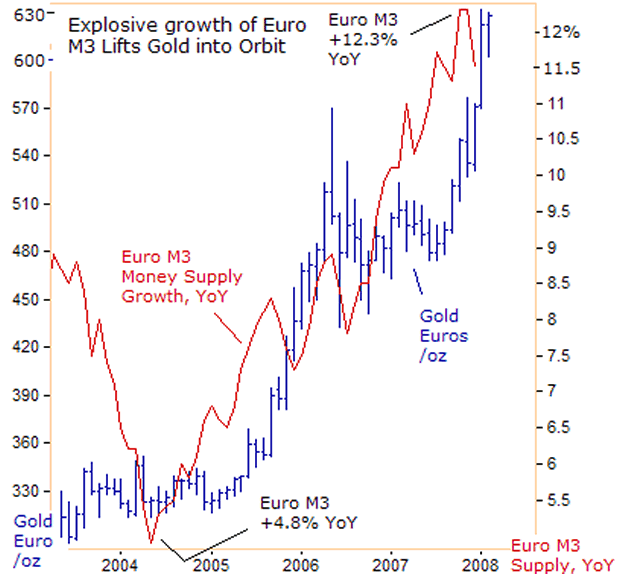
Yet under the leadership of "Tricky" Trichet, the purchasing power of the Euro in "hard money" terms, measured against the price of gold, has collapsed by 90% over the past four years. Speaking to the World Economic Forum in Davos on Jan 24th, "Tricky" Trichet told central bankers that under the capital market system it was natural for risks to emerge, but central bankers' main job is to solidly anchor inflation expectations. "There is one needle in our compass and it is price stability."
"What is extremely important is to offer as steady grounds as possible. First, price stability and then solidly anchor inflation expectations. If risks did not materialize you would not be living in a market economy, you would be living in the Soviet Union," Trichet explained. Yet 2-weeks later, Trichet was shifting his vigilant stance against inflation, and leaving the door ajar for ECB rate cuts in the months ahead.
On Feb 7th, the ECB kept its repo rate steady at 4.00%, but Trichet placed equal stress the downside risks to the Euro zone economy, on par with worries over inflation. "Uncertainty about the prospect for economic growth is unusually high and the risk surrounding the outlook for economic activity lies on the downside. Looking ahead, the slowdown in the economies of some of the euro area major trading partners is likely to have an impact on euro area real GDP growth in 2008," he said.
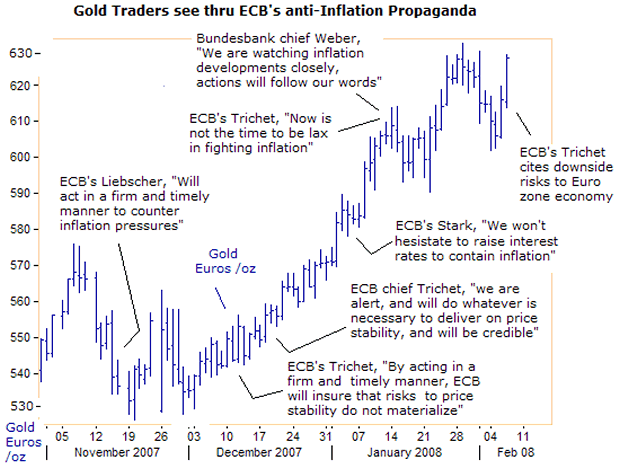
Trichet's comments about a slowdown in the Euro zone economy were viewed as a sign of capitulation, and that the ECB is open to cutting its interest rates for the first time in almost five years. The Gold market knows what nobody knows, and understands that lower ECB interest rates will further inflate the Euro M3 money supply. The yellow metal jumped to a record 630 euros/ oz, during Trichet's press conference, and is up roughly 16% over the past three months.
Slowing euro zone growth, a slowdown in the Chinese and global economy, financial market turmoil and the strong euro might eventually compel the ECB to cut interest rates rather than raise them. Financial markets in Frankfurt have already priced in rates falling to 3.5% by year-end, after cuts by the Fed and central banks in Britain and Canada to bolster their stock markets from the toxic sub-prime debt bomb.
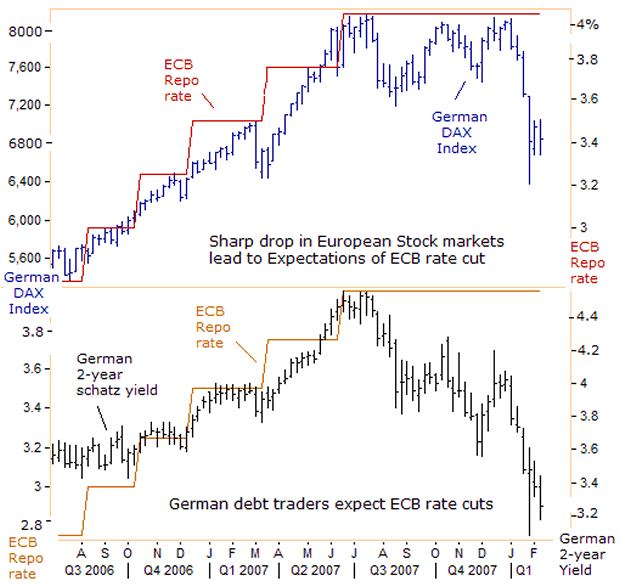
For the past few years, the ECB has pursued a policy of "Asset Targeting" adjusting its repo rate in baby steps, and in-line with the direction of the Euro zone stock markets, such as the benchmark German DAX Index. In the aftermath of the German DAX's sudden 15% devaluation, traders expect the ECB to follow suit, with a small round of rate cuts to 3.50% in the months ahead.
The yield on the German 2-year schatz has tumbled to 3.25%, far below the ECB's 4.00% repo rate, another strong signal that the ECB will eventually abandon it empty "war of words" against inflation, and exercise the "Trichet Put" by lowering the repo rate. Very few traders in the gold market or German schatz, believe the rhetoric of Greek central banker Nicholas Garganas who warned on Feb 1st, "Our monetary policy is not led on what the markets expect. I'm very concerned about the high inflation rate. Inflation risks remain on the upside," he said.
Garganas said the ECB has noted that risks to the Euro zone economy were on the downside, but "Our baseline scenario has not changed. The impact of the slowdown in the US is to some extent offset by continued strength in emerging market economies," he said. At the same time, strong demand for commodities has contributed to unprecedented inflationary forces that are pushing global prices up.
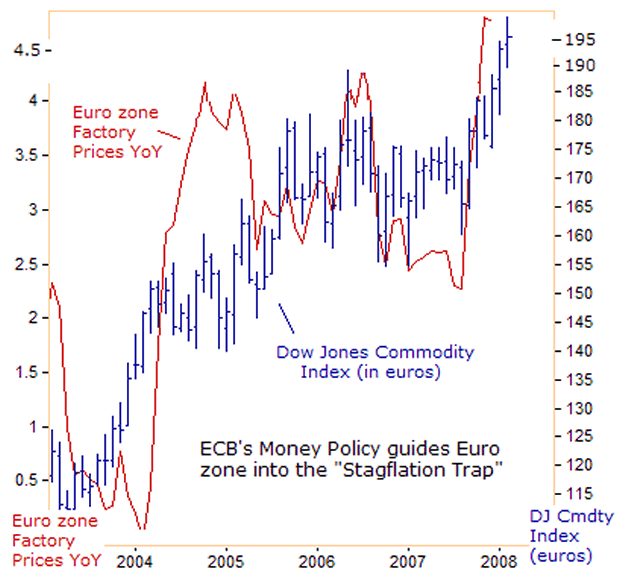
Commodity prices, as measured by the Dow Jones AIG Index, in euro terms, are soaring to all-time highs, led by corn, soybeans, rice, wheat, sugar, platinum, gold, silver, and high energy prices. Tracking the general direction of commodity prices, Euro zone factory prices are 4.7% higher from a year ago, so an easier ECB money policy, would simply generate faster inflation, and bury the Euro zone economy deeper into the dreaded "Stagflation Trap."
"Tricky" Trichet is well aware of the inflation risks of slashing interest rates to rescue the stock markets. In a speech delivered on April 23, 2002, he said, "My feeling is that we should remain extremely cautious about it, because it would be like opening Pandora's Box, if we start setting our key policy rates according to asset price changes. Not only could large swings, misalignments and bubbles of assets prices endanger price stability, which is the main objective of most central banks, but also they could impinge upon financial stability," he added.
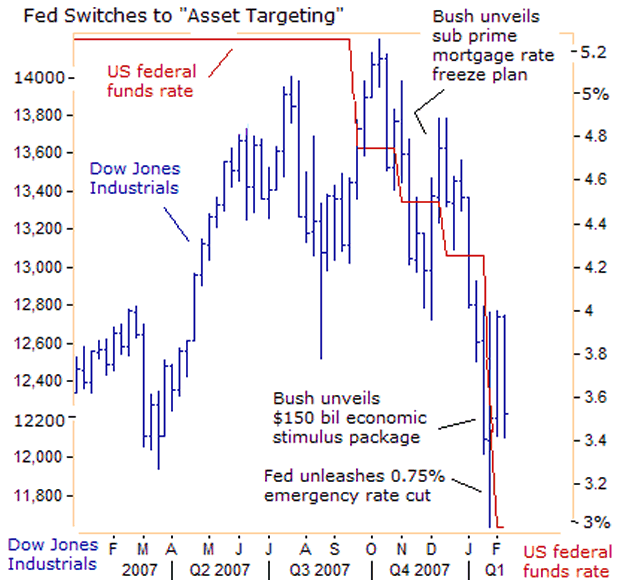
Yet global traders expect "Tricky" Trichet to eventually show his weak hand, and follow Fed chief Ben "B-52" Bernanke, who has pumped tens of billions of dollars into the banking system since August, desperately trying to place a "safety net" under the US stock markets. "B-52" Ben used a chain saw to cut the US fed funds rate by a hefty 0.75%, the biggest single rate cut in more than 23-years, after global stock markets melted own, and lost $7.5 trillion of value last month.
Easy" Al Greenspan had a magic formula for rescue operations during times of financial distress. From the stock market crash of 1987, to the S&L crisis of the early 1990's, to the Asian crisis and the collapse of LTCM, to the feared Y2k crisis, to the bursting of the tech stock bubble, Greenspan simply injected massive doses of monetary morphine to bailout over-zealous speculators in the stock market.
Global traders must see thru the ECB's game of "Smoke and Mirrors" designed to fool most people, most of the time." Follow the money, and not the ECB's empty rhetoric and propaganda that fly across the newswires each day. And remember, gold knows what no one knows. "At some point, you have to choose between trusting the natural stability of Gold, and the honesty and intelligence of members of the government. With due respect for these gentlemen, I advise you, as long as the capitalist system lasts, to vote for Gold," said George Bernard Shaw in 1928.
By Gary Dorsch,
Editor, Global Money Trends newsletter
http://www.sirchartsalot.com
To stay on top of volatile markets, subscribe to the Global Money Trends newsletter today, which includes a special bonus for new subscribers, - “Audio Broadcasts”, posted on Monday and Wednesday evenings, during Asian trading hours, to the Log-In section of our website. This article was just the Tip of the Iceberg , of what's inside the Global Money Trends newsletter, published on Friday afternoon. Here's what you will receive with a subscription,
Insightful analysis and predictions of the (1) top dozen stock markets around the world, Exchange Traded Funds, and US home-builder indexes (2) Commodities such as crude oil, copper, gold, silver, the DJ Commodity Index, and gold mining and oil company indexes (3) Foreign currencies such as, the Australian dollar, British pound, Euro, Japanese yen, and Canadian dollar (4) Libor interest rates, global bond markets and central bank monetary policies, (5) Central banker "Jawboning" and Intervention techniques that move markets.
GMT filters important news and information into (1) bullet-point, easy to understand analysis, (2) featuring "Inter-Market Technical Analysis" that visually displays the dynamic inter-relationships between foreign currencies, commodities, interest rates and the stock markets from a dozen key countries around the world. Also included are (3) charts of key economic statistics of foreign countries that move markets.
Subscribers can also listen to bi-weekly Audio Broadcasts , with the latest news and analysis on global markets, and view our updated model portfolio for Q'1, 2008. To order a subscription to Global Money Trends , click on the hyperlink below,
http://www.sirchartsalot.com/newsletters.php
Mr Dorsch worked on the trading floor of the Chicago Mercantile Exchange for nine years as the chief Financial Futures Analyst for three clearing firms, Oppenheimer Rouse Futures Inc, GH Miller and Company, and a commodity fund at the LNS Financial Group.
As a transactional broker for Charles Schwab's Global Investment Services department, Mr Dorsch handled thousands of customer trades in 45 stock exchanges around the world, including Australia, Canada, Japan, Hong Kong, the Euro zone, London, Toronto, South Africa, Mexico, and New Zealand, and Canadian oil trusts, ADR's and Exchange Traded Funds.
He wrote a weekly newsletter from 2000 thru September 2005 called, "Foreign Currency Trends" for Charles Schwab's Global Investment department, featuring inter-market technical analysis, to understand the dynamic inter-relationships between the foreign exchange, global bond and stock markets, and key industrial commodities.
Copyright © 2005-2008 SirChartsAlot, Inc. All rights reserved.
Disclaimer: SirChartsAlot.com's analysis and insights are based upon data gathered by it from various sources believed to be reliable, complete and accurate. However, no guarantee is made by SirChartsAlot.com as to the reliability, completeness and accuracy of the data so analyzed. SirChartsAlot.com is in the business of gathering information, analyzing it and disseminating the analysis for informational and educational purposes only. SirChartsAlot.com attempts to analyze trends, not make recommendations. All statements and expressions are the opinion of SirChartsAlot.com and are not meant to be investment advice or solicitation or recommendation to establish market positions. Our opinions are subject to change without notice. SirChartsAlot.com strongly advises readers to conduct thorough research relevant to decisions and verify facts from various independent sources.
Gary Dorsch Archive |
© 2005-2022 http://www.MarketOracle.co.uk - The Market Oracle is a FREE Daily Financial Markets Analysis & Forecasting online publication.



